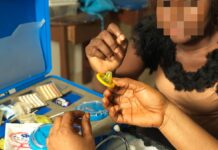The natural hosts for the Ebola virus are thought to be the fruit bats that belong to the Pteropodidae family.
Ebola virus can be transmitted in the following ways:
- When there is direct contact with an Ebola-infected person’s mucous membranes or broken skin.
- Close contact with the secretions, body fluids, blood or organs of infected animals (like fruit bats, gorillas, porcupines, chimpanzees, forest antelopes and monkeys) even when they are dead.
- The virus can also be transmitted from person to person through direct contact with the sweat, secretions, saliva, semen, tears, blood, breast milk, vomit, body fluids, or organs of infected persons. This direct contact can be through mucous membranes or broken skin.
- Contact with bedding, needles, syringes, surfaces and clothing that have been contaminated with organs, blood, body fluids or secretions of infected individuals.
- When health care workers do not adhere strictly to infection control safety precautions, then the Ebola virus can be transmitted to them while they provide health care for Ebola-infected patients.
- Ebola can also be spread through direct contact with the dead body of a person who was infected with the virus.
- Contact with any object that has been contaminated with any of the body fluids of an Ebola-infected person.
- Use of inadequately/improperly sterilised non-disposable equipment that was previously used on Ebola-infected person on an uninfected person.
- Contact with the semen or vaginal fluid of an Ebola-infected person; or even someone who has recovered from an Ebola infection (Ebola survivor). The Ebola virus has been found in the semen of some of the men who recovered from Ebola. Therefore, Ebola could also be spread through sexual intercourse and/or any contact with the semen of these men. How long the virus remains in the semen of a male Ebola survivor is unknown – it varies from man to man (for some, about 3 months; and others, 9 months). Results from research suggest that the quantity of the virus in the semen gradually reduces with time until it is no longer present. Since information on spread of Ebola through sex with Ebola survivors is not conclusive, it is best to avoid sexual contact with them.
As far as the Ebola virus is in the blood of an infected person, he/she will be able to infect others.
Ebola-infected individuals do not become infectious until they start having symptoms of the Ebola disease.
It is also important to know that Ebola is not spread through food, water or air. However, if the body fluid, mucous membrane or broken skin of an Ebola-infected person has already come in contact with the food or water, there is a risk of being infected. There has been no evidence that Ebola is spread through sneezing or coughing; but large droplets of splashes of saliva or other respiratory secretions released by an infected person when coughing or sneezing could be contagious. There is also no evidence to suggest that Ebola is spread by any insects – like mosquitoes. So we can breathe a little easier on that account.









